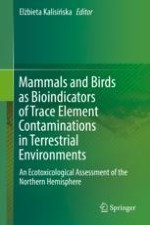2019 | OriginalPaper | Chapter
19. Tin, Sn
Authors : Agnieszka Tomza-Marciniak, Bogumiła Pilarczyk, Andrzej Marciniak, Renata Pilarczyk, Małgorzata Bąkowska
Published in: Mammals and Birds as Bioindicators of Trace Element Contaminations in Terrestrial Environments
Publisher: Springer International Publishing
Activate our intelligent search to find suitable subject content or patents.
Select sections of text to find matching patents with Artificial Intelligence. powered by
Select sections of text to find additional relevant content using AI-assisted search. powered by
